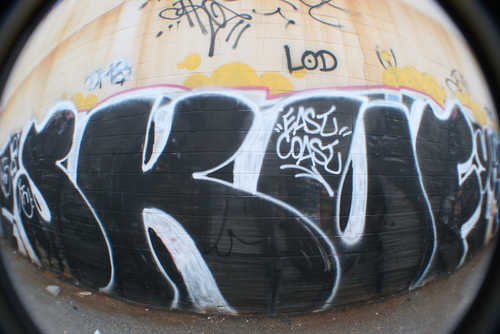Self Potrait
dal 21/6/2006 al 2/9/2006
Segnalato da
21/6/2006
Self Potrait
Martinez Gallery, New York
Work of 12 contemporary graffiti writers: a history that the institutional art world, and politicians, ignore and even censor. An exhibition that puts the artists behind the graffiti movement on display, challenging stereotypes about both the form and its practitioners.

Curated by Antonio Zaya
To paraphrase Brecht’s “Book of Changes," the nation that would draw from
its own written histories has much to gain. That same advantage falls upon
those who would record their own personal histories.
The Martinez Gallery is pleased to present SELF-PORTRAIT, a
groundbreaking new exhibition that puts the artists behind the graffiti
movement on display, challenging stereotypes about both the form and its
practitioners.
This collective self-portrait, which includes the work of twelve
contemporary graffiti writers, exposes a history that the institutional art
world, and politicians, ignore and even censor. But the real legend of New
York graffiti is a three-decade’s old story that never is truly and honestly
told, one that reminds us, as critic Charles Merewether says, “the past is
not finished."
SELF-PORTRAIT consists of the work of CASE 2, COCO 144, GIZ, JA, KEZ 5, LES,
NATO, NOXER, RATE, SKUF, TRACY 168 AND VFR displayed within the confines of
a theatrical forum, and instead of delivering the predictable punchline of
graffiti as received in popular culture, these artists produce a wildly
varied, unexpected and nakedly honest portrayal of themselves and their
form.
Their appearance in this unexpected venue aims at what is perhaps the most
unique, central and misunderstood, element of graffiti: authorship. A
strange breed of narcissism, authorship adopts, replaces, substitutes and
obscures the name itself, a game played with destiny through illegal means.
Although the graffiti writer does not reveal his “real identity" in his
clandestine works, what he has done, what he does and what he will do to
establish a different, equally real, real identity. And that identity is
jealous; it consumes the artist, devours him, removing him from both his old
life and the official lists of “power art," making of him a delinquent in
more ways than one.
Thus the themes so common to graffiti:
--Is one’s identity that which he creates or that which others create for
him?
--Is one’s identity invented or that which we are allowed to see?
--Is it what one learns or what he rejects that defines a person?
The graffiti writer concerns himself, constantly, with identity; always he
dwells on his origins, race, barrio, popular culture; the mirrors that
society holds up to him. His deal with the world is a cruel one: the city
walls are his picture of Dorian Gray, his mirror and his youth spent. Faced
with power that seems to always cast him out, he reacts with exhibitionism,
dissidence, resistance, pride, survivalism, folly, crime and repentance - a
passionate, painful life of social invisibility. He is today’s Invisible
Man.
In SELF-PORTRAIT, the graffiti writer is lost in himself, like fragments of
a shattered looking glass, a prisoner of the reality he has defined. His
identity can only be found in the shadows, corners and limits of society.
But the lingering question is one that Brecht proposed in critiquing
supposedly “bad" art: why do we need such medicine? Why do we need graffiti?
Beyond thinking about authorship, one of the objectives of SELF-PORTRAIT is
to eradicate the line of thinking that associates graffiti only with spray
paint. In this show, graffiti looks at itself through photography, video,
drawing, installation and performance, exploring its very real, if seldom
seen, body, context, action and lasting mark. Artists spanning 36 years of
the history of a form born in New York and adopted by the entire world,
despite endless repression, gather to make themselves evident
Opening: 22, June, 2006 from 6 - 8
Martinez Gallery
37 Greenpoint Avenue - New York
Hours: Fridays & Saturdays 12 - 6 PM and by appointment.



